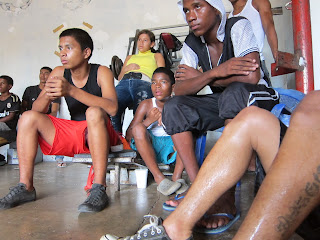"What's better than good? Not doing harm."
It could be my background in Anthropology, but I couldn't get that thought out of my head as we were in Ensanada a small community of ~350 Ngöbe people in Bahia Azul.
In addtion to running the mobile health clinic, we had a public health team perform a survey to assess the level of understanding in the area regarding HIV/AIDS transmission. Our most excellent public health team went out door to door. We crossed the bay in a kyukas, traversed across logs, went into the mangroves, trekked through swampy mud , and got attacked by large black ants during the day and blue crabs in the middle of the night. Some houses would welcome us in, sharing snacks or bananas. Other houses were understandably skeptical and would turn us away.
 |
| Most excellent public health team |
 |
| Gift from a home I visited |
There was a Peace Corp worker in Ensanada who at least twice a day would gently remind our group that our goal should be to "make sure everyone felt good about us coming to visit even if they learned nothing about HIV/AIDS". It was the best advice. Sending love and opening ourselves to this community was a demonstration that we can be trusted, which will pave the way for the next public health team that goes out.
The long-term goals of this project is to get this community tested for HIV/AIDS and then get treatment for those who need it. Currently, there is a confirmed case of HIV with a 3 year old girl. Her mom died last year from AIDS. A total of 3 deaths in the community last year are thought to be from AIDS though this is not confirmed. However, AIDS is of particular concern in this community where the Ngöbe people are tolerant of infidelity and there is essentially no access to medical care. Women are aware that their husbands, who leave for work for weeks at a time, will have relations with other women. While men and women are using condoms some of the time, it is not happening consistently because there are not condoms readily available. If they are using condoms they may not be using them correctly. One Ngöbe man said that he was using 3 condoms to be extra safe.
 |
| Interviewing a house |
Of course the primary goal of this trip was to hold a mobile clinic. This was going on while the public health teams were out in the community. The clinic team consisted of two doctors, two nurses, and a future medical student. I am not sure what the final patient count was, but I believe they saw around 120 patients in 2 days. Everyone did an incredible job especially the two doctors. Seeing how hard they worked for 10+ hour days in 90 degree heat gave me a new-found appreciation for the medical staff at Floating Doctors.
After a full day in the clinic the clinical team made house calls to see patients who were too sick to walk to the clinic site. I need to emphasis that these "walks" to the house calls are not leisure especially if you are going after dark where footing can be misleading with only a headlamp.
 |
| "Leisurely" walk to a Ngobe house |
 |
| One of our doctors working with a Ngöbe woman |
After the long days we had some fun with my camera and I took some long exposure shots of the stars which turned into some shots of kids running around with headlamps/flashlights. I also had the amazing experience of swimming in bioluminescence which cannot be captured on my small point and shoot - but, of course, I still tried.
 |
| Abundance of stars!! |
 |
| "AMOR" |
 |
| Bioluminescence.... of course!
|
















